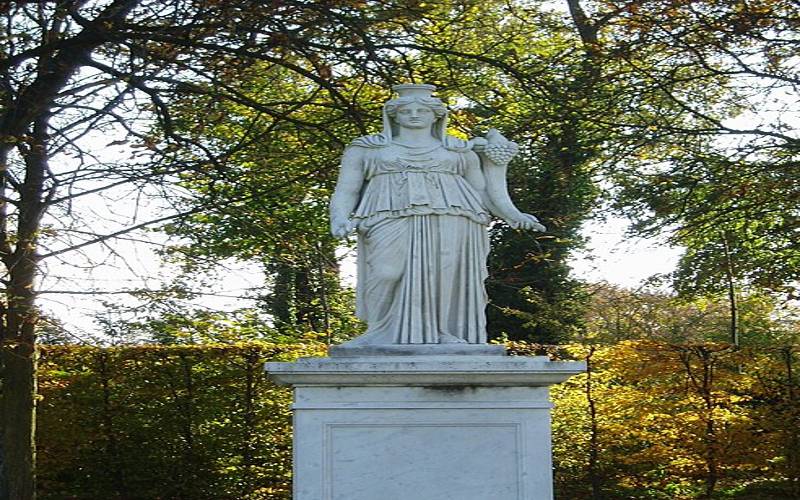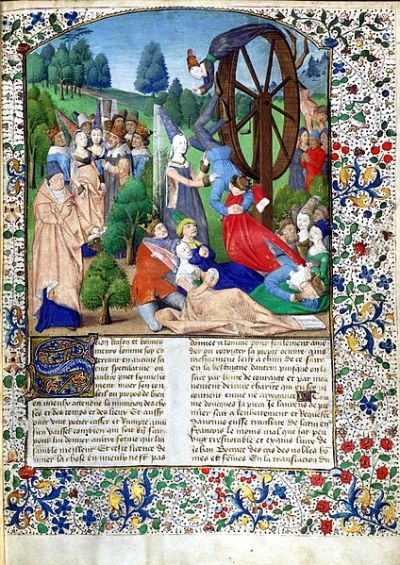When it comes to ancient mythologies, few figures capture the essence of chance and fortune as vividly as Fortuna, the Roman goddess of luck. Known also as Lady Fortune, she is not just a mythical figure. She also embodies the very essence of luck and fate, intertwining our lives with her invisible threads.
To put it simply, her influence spans from the bounties of a good harvest to the capricious turns of fate. As a result, it resonates deeply with those of us who seek an understanding of the divine.
The Origins and Myths of Fortuna
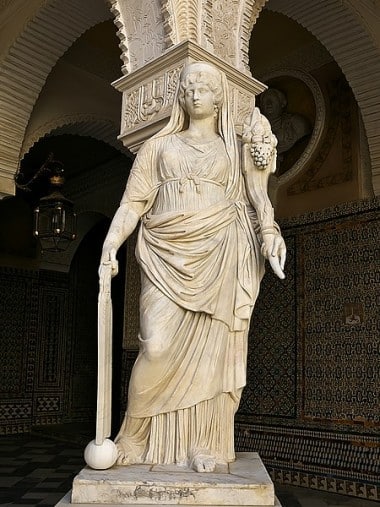
Fortuna’s origins are deeply rooted in the Roman culture. Originally, Fortuna was revered as a goddess of fertility and blessing, closely tied to the agrarian society of early Rome. Afterward, her worship evolved as Rome itself transformed from a collection of tribes to a mighty empire.
This evolution of her worship mirrors the changing fortunes of Rome, from a humble city-state to a vast empire. It also shows how Romans viewed the forces of chance and destiny, seeing them as integral to their daily lives and state affairs.
Birth and Early Myths
The tale of Fortuna’s origins is as enigmatic as the concept of fortune itself. According to one legend, she was born as a deity of blessing and abundance. Basically, she was the guardian of the earth’s fertility and the prosperity of farmers.
Another legend speaks of her as the daughter of Jupiter, the king of gods, and Venus, the goddess of love and beauty. Overall, this version symbolizes Fortuna’s power over both the material and spiritual realms.
Both legends show Fortuna as a multifaceted deity, one who held sway over the fortunes of not just individuals but entire communities and the empire itself. Hence, her birth and rise to prominence signify the ancient belief in the connection between divine will, human endeavor, and the capricious nature of luck.
Want To Bring More Fortuna Qualities In Your Life?
- Get yourself a Fortuna figurine. If you can’t find one, you can use any female figurine instead. When thinking about your goals and dreams, hold this figurine tightly in your hands. You can also hold it when meditating. Let this figurine become the symbol of your fortune.
- Surround yourself with Fortuna’s symbols. For example, you can wear golden jewelry or get a pet rabbit. Whatever reminds you of this goddess is a good choice.
- Also, remember that both bad and good luck are part of life. Don’t despair when you have bad luck, and don’t become too conceited when you have good luck. In short, hope for better days, but be prepared for bad times as well.
- Now and then, test your luck. Play a bingo game or do something moderately risky. Believe that the luck will be on your side. Even if you lose, enjoy a little bit of risk. Of course, you shouldn’t take unnecessary risks. Still, you can play with your luck without risking too much.
- If you want to bring more Fortuna qualities into your life, consider exploring the exciting world of online casinos and slot games. One way to do this is by searching for a comprehensive list of free spins no deposit offers. Fortuna, the Roman goddess of luck, favored those who embraced opportunities, and these free spins can be your chance to test your luck and potentially win big without any initial investment. By taking advantage of these free spins, you can immerse yourself in the thrill of casino games, experience the excitement of chance, and channel your inner Fortuna as you spin the reels in search of fortune and good luck. It’s a risk-free way to introduce a little more excitement and prosperity into your life.
Myths and Legends Surrounding Fortuna
One of the most compelling legends about this goddess is her association with the Wheel of Fortune. This wheel, constantly spinning, symbolizes the ever-changing fate of humans – kings can become beggars and vice versa, all at the whim of Fortuna.
This legend reflects the Roman belief in the transient nature of earthly fortunes and the fickle hand of fate. Additionally, it serves as a reminder that one should always be prepared for change, whether for good or ill.
The Duality of Fortune
Another interesting story involves Fortuna’s dual aspect of bringing both good (Bona Fortuna) and bad fortune (Mala Fortuna). In short, this goddess had two temples in Rome. One was for Bona Fortuna, built by Servius Tullius, symbolizing her benevolent side. The other was for Mala Fortuna, representing her ability to bring misfortune.
This duality in the worship of this goddess highlights the acceptance of both the positive and negative aspects of life, acknowledging that both are under the purview of the divine.
Fortuna and the Roman Pantheon
This goddess also appears in various tales interacting with other Roman deities, showcasing her integral role in the Roman pantheon. In some stories, she is depicted as a mediator between the gods and humans.
She controlled the distribution of riches and poverty, success, and failure, as decreed by the higher deities. Overall, these interactions underscore her role as a bridge between the mortal and the divine, governing the fortunes of both realms.
Fortuna’s Universal Influence
Furthermore, Fortuna’s influence extends beyond the boundaries of Rome. For example, in various myths, she affected the fates of heroes and cities, guiding them through her invisible hand. Her presence in these stories symbolizes the universal nature of fortune and fate. As such, it transcends geographical and cultural boundaries.
Roles and Attributes of Fortuna
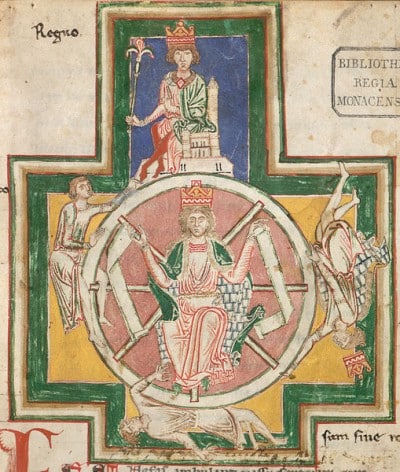
Fortuna has the power to bestow luck and fortune, touching every aspect of human life. Her influence is not limited to mere material wealth. On the contrary – it extends to the fortunes of war, the success of harvests, and the fate of individuals. She is a guardian of balance, distributing her favors and trials in equal measure.
She is an unpredictable goddess; we can never know her plans. For instance, when we expect good fortune and nice things, she brings challenges instead. However, she also brings us a glimmer of hope and luck when we are at our lowest.
The Description and Appearance
Artistic depictions often show Fortuna with items that symbolize her control over fortune. The cornucopia, or horn of plenty, frequently accompanies her, overflowing with fruits and grains, symbolizing abundance and prosperity.
This image resonates deeply with those of us who see the divine hand in the bounties of nature. In her other hand, she often holds a ship’s rudder, steering the fate of those at sea. This is a poignant reminder of her control over our life’s direction.
Sometimes, she is blindfolded, spinning her Wheel of Fortune, a stark symbol of life’s unpredictability and the impartial distribution of fate.
Fortuna’s Rituals and Festivities
Ancient Romans worshipped Fortuna by participating in various rituals and practices that sought her favor. Her temples and shrines were places of pilgrimage for those seeking divine intervention in their fortunes.
During these rituals and festivities, people offered sacrifices, conducted ceremonies, and invoked her name. However, they didn’t simply ask for material gains. Fortuna’s devotees wanted a deeper communion with the divine essence of Fortuna.
Festivals in honor of Fortuna, such as the Fors Fortuna, were significant events in the Roman calendar. These celebrations were not just social gatherings but deeply spiritual occasions. There, communities came together to honor the goddess of fortune.
The rituals and festivities were expressions of gratitude and hope, a collective aspiration to align with Fortuna’s benevolence. In these celebrations, the ancient Romans wanted to show a deep reverence for the unseen forces that shaped their lives.
Fortuna’s Relationship with Other Roman Deities
Fortuna’s relationship with Jupiter, her father, positions her as a deity of considerable power and authority. In contrast, her connection with Venus, her mother, imbues her with an aspect of grace and beauty. These relationships symbolize the dual nature of fortune – powerful yet graceful, authoritative yet benevolent.
Fortuna and Other Religions
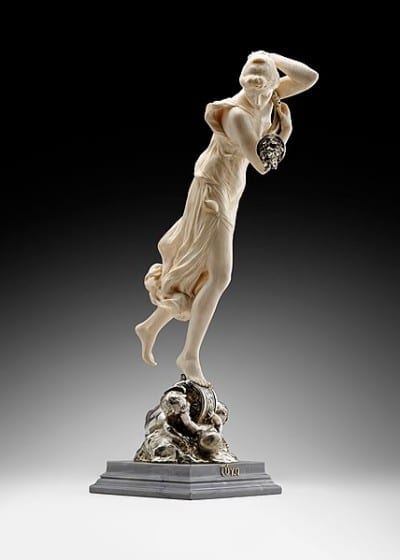
Roman deities, including Fortuna, are often compared to Greek deities. Many Roman gods are simply Romanicized versions of Greek gods. For example, the Greek “version” of this goddess is Tyche – the goddess of fortune and prosperity.
Apart from Tyche, there are other Greek deities that ruled over the course of human life. Moirai, also known as Fates, were the three sisters in Greek mythology who personified destiny. Their role was similar to Fortuna’s.
Similarly, the Norse goddess Frigga used a spindle to determine the destiny of all humans. One could say that Frigga had a similar role to Fortuna because both goddesses could bring both good and bad luck.
Hindu goddess Lakshmi is probably the most similar to Fortuna. Lakshmi is the goddess of fortune, destiny, and prosperity.
Fortuna’s Legacy
Fortuna is a timeless symbol of the unpredictable journey of life. Her enduring legacy in mythology, art, and culture is a testament to humanity’s eternal quest to understand and influence fate.
For those of us on a spiritual path, she is not just a mythological figure but a representation of the divine interplay of forces that shape our lives. She teaches us to embrace the unpredictability of life, to see the divine hand in the twists and turns of fate, and to find balance and meaning in the ever-changing fortunes of our existence.
Nowadays, Fortuna’s legacy continues to influence our understanding of luck and fortune. Her presence is felt in the way we speak of chance, in the rituals we perform for good luck, and in our collective consciousness as a symbol of life’s unpredictability.
She represents a timeless truth – that the universe operates on principles beyond our full comprehension. Her relevance today lies in her ability to remind us of the delicate balance of life, encouraging us to embrace both the good and the bad with equanimity and grace.
Finally, in a world that often seems governed by random chance, Fortuna stands as a reminder of the divine forces that subtly guide our destinies.
Fortuna’s Symbols
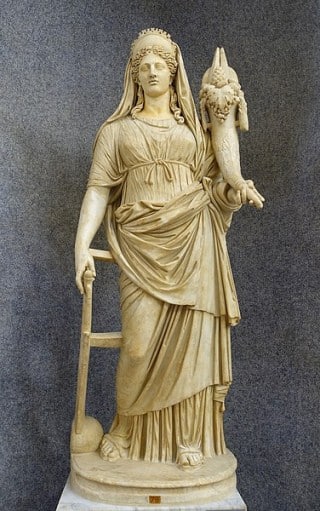
Fortuna’s symbols are rich and multifaceted. They teach us to accept the ebb and flow of life with grace and humility. By wearing her symbols, you recognize that the divine forces at play are beyond our mortal understanding.
General
The most common symbol of Fortuna is the wheel of fortune. This wheel represents the cyclical nature of luck and fortune – how they can change at any moment, elevating the lowly and bringing down the mighty.
Sometimes, you can see her with a blindfold over her eyes. This depiction is particularly intriguing, suggesting that fortune does not discriminate. The fortune is as random and impartial as the goddess herself.
Some other symbols are cornucopia, globe, ship’s rudder, and wreath.
Animals
This goddess didn’t have sacred animals that could be her symbols, but you can use any animal that symbolizes good luck. For instance, fish is a symbol of luck, so you can use it as Fortuna’s symbol. Additionally, you can choose other animals, such as rabbits, frogs, and elephants.
Plants
Again, this goddess didn’t have sacred plants that you can use as her symbols. However, there are many plants out there that symbolize good luck and fortune. Some of these plants are bamboo plant, jade plant, four-leaf cover, basil, rosemary, and bay leaf.
Perfumes/Scents
Scents and perfumes that symbolize good luck are cinnamon, patchouli, bergamot, and jasmine. Furthermore, you can use scents or perfumes that contain vanilla, sandalwood, rose, mint, and myrrh.
Gems and Metals
Gold is one of the most popular symbols of wealth, fortune, and prosperity. As a result, it is a perfect symbol for this goddess. Some other great choices are rubies, emeralds, garnets, and jade stones.
Colors
Colors that symbolize fortune and luck are green, red, gold, blue, purple, and white. You can use them as symbols of Fortuna.
Meditations to Invoke The Goddess Fortuna
- Goddess of fortune, bring me your gifts and guide me through the darkest days.
- Spin your wheel for me, powerful Fortuna.
- Let my fortune flow and my prosperity grow.
- Guide my destiny and lead me to my goals.
- Let the gold shine on my hands, and the happiness burn in my heart.
- Make me rich and fortunate, mighty Fortuna, not just with money.
Featured Image Credit: Fortuna, sculpture by Eduard Stützel, 1855. Half rondel Neues Palais, Potsdam, Germany

